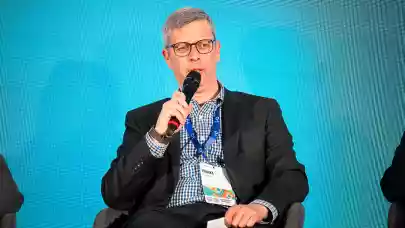
Property Forum sat down with Piotr Trzciński, Head of Poland and Andrew Allen, Global Head of Research, Product Strategy and Development at Savills Investment Management, to talk about the company’s investment strategy in Europe and Poland in particular. They also talked about Savills IM’s ambition to become net zero by 2040 and the way ESG is shaping future developments in the European commercial real estate sector.
How are you managing soaring energy prices as an investor?
Piotr Trzciński: Today’s energy crisis impacts the income side, however, we are in a relatively fortunate position as our portfolio in CEE is mainly Poland and mostly new stock. It is, by definition, more energy efficient. The majority of our assets are certified BREEAM very-good level. Even before the crisis broke out, we have taken extra measures to ensure energy stability while improving the energy performance of these assets. For instance, intelligent building management systems were installed or upgraded to manage power use for lighting, elevators, and other elements. We have converted lighting to LED across the board. We have installed motion detection sectors or inverters in our largest office and retail assets and are working closely with a specialist advisor EP&T on further reduction of energy use. On logistics, we are considering adding heat pumps and photovoltaic panels for selected units.
Andrew Allen: Much of the average stock of European industrial and logistics property is out of date and operationally inefficient. It is obvious that occupiers want to be in a better-quality space and will pay good rents for such space. This is likely to cause a problem for second-tier and older space, which will increasingly become obsolete because of utility costs. Nonetheless, most of our pan-European industrial and logistics stock is modern for a reason.

Andrew Allen
Global Head of Research, Product Strategy and Development
Savills Investment Management
How would you summarise Savills IM’s ESG strategy? Has it changed in the recent period considering the challenging conditions on energy?
Piotr Trzciński: Our ambition is to be a leading influencer on responsible investing, delivering on climate action, people and nature goals. According to our Net Zero Carbon pathway, we aim to reduce our emissions by 50% until 2030 and reach net zero status by 2040. By 2050 we aim to become a restorative business so that we give back to the community more than we take out.
In the last 2 years, we have gone from strategic planning to execution mode. Recently we have been busy doing net-zero audits of our stock, identifying countries with the highest emissions and stranding risks. This way, we can earmark priority assets for improvements. Obviously, energy-reduction initiatives are at the forefront. There is of course no hard evidence that green-labelled assets will trade at a premium to non-green-labelled assets and by far ESG-related capex investments are a defensive strategy But we are of the view that if investors and managers fail to future-proof their assets, their liquidity on exit will decrease while rising costs of financing will weigh on total returns.

Piotr Trzciński
Head of Poland
Savills Investment Management
Most investment strategies focus on the ‘E’ component of ESG. What’s your approach to tackling the other two components?
Piotr Trzciński: While we have made good strides in enhancing governance, our firm-wide objective for the next 3-5 years is to focus more on the social impact of both our business and our AuM. Generating positive social impact does not preclude financial performance. Yet, the environmental component may be more intuitive to tackle because it is often linked to real estate capex, whereas the social aspect is about creativity and empathy. In Poland, we have been involved in social impact initiatives long before the “S” was in fashion. For example, in our largest office asset, Gdanski Business Center, we would hold an annual tenant community engagement event called „Planting Steps!” and frequent recycling collections for items like shoes, hand-me-down clothes, electro-waste etc. Also, we are in the process of obtaining the “Building without barriers” certification for GBC. When the Ukrainian refugee crisis emerged, we provided shelter space to refugees at Galeria Katowicka, made substantial material donations and organized charity collections. We have also held the “Katowicka for Autism” event recognizing ambience-related challenges to people with ASD.
Andrew Allen: In Europe, including Poland, we will be investing more in residential. We want to be more at the affordable end of the housing market which does not mean necessarily public housing. In these kinds of projects, there are significant community benefits and great investment returns.
There just are not enough affordable, mainstream modern houses in Europe. We can see that there is an obvious trade-off. If you can lower the utility costs of a residence, then the basic math says residents can probably afford to pay a higher rent. If we treat our residents well, they will stay longer in our rental properties, while our operating income stays higher. Also, policymakers get more houses built, which is a win-win.
There are relatively few pan-European investment managers that have focused on residential to date. The market sizes are huge. If we hit €3- 5 billion AUM in the next five years, which I think is realistic, that is actually a drop in the ocean compared to the size of the real estate market. We are open to all asset types: single-family housing, multifamily housing, senior living, purpose-built student accommodation and co-living.
Besides residential, what other assets are you focusing on as part of your European investment strategy?
Andrew Allen: The living sector is something we have wanted to do for a long time, and we have the capital to help us do that. We are still very much in favour of industrial and logistics. We know that modern quality products in the right locations will do well. We also know that the major cities in Europe face land constraints. Thus, an urban-oriented industrial and logistics strategy is compelling.
Piotr Trzciński: Looking at it from a strategic point of view, we have tapped into sector drivers like e-commerce and urbanization early, having acquired across the supply chain e.g. regional distribution centres and urban multi-let units. Going forward we will focus on last-mile logistics, especially that European countries did not move with the same speed as far as e-commerce is concerned in terms of market penetration.
Is there strong competition for industrial assets?
Piotr Trzciński: Equity has not evaporated. Given current headwinds, investors are mostly focused on preserving their cash flows and protecting the performance of existing assets. My belief is that as and when interest rates are more predictable, and both vendors and sellers will know how to underwrite transactions, liquidity will increase and transaction volumes bounce back. We think further repricing is underway and dislocation may open up interesting investment opportunities.
What is your approach to office and retail segments?
Andrew Allen: We are big fans of pan-European food retail. It has got a similar idea to affordable housing. It is necessity-based and pan-European food retailers are typically very strong, financially rated entities. On offices, we tend to own prime projects and occupiers want the best possible space, they want high quality, energy efficient, nicely designed offices that are suitable for hybrid working.
Piotr Trzciński: Tenants, especially corporate ones, have their own ESG targets they need to achieve in the next 10-20 years. You will see more tenants wanting to occupy net-zero or close to near-net-zero buildings, that not only implies certain upgrades or retrofits of the existing office stock but there is also pressure on new developments to match those ESG targets.
What is your investment strategy in Poland?
Piotr Trzciński: We would not recommend investing in retail, except grocery anchored schemes, which we believe to be resilient. Offices – probably not in the short term, unless we make any tactical acquisitions of modern office stock for some of our mandates, which may be possible. Living is the market we want to get into. It is a very local and granular asset class, so we are in the process of getting local market specifics and partnership structures right for the purposes of diligent underwriting. When the market stabilizes, we want to be there with the equity to make a quick move.



